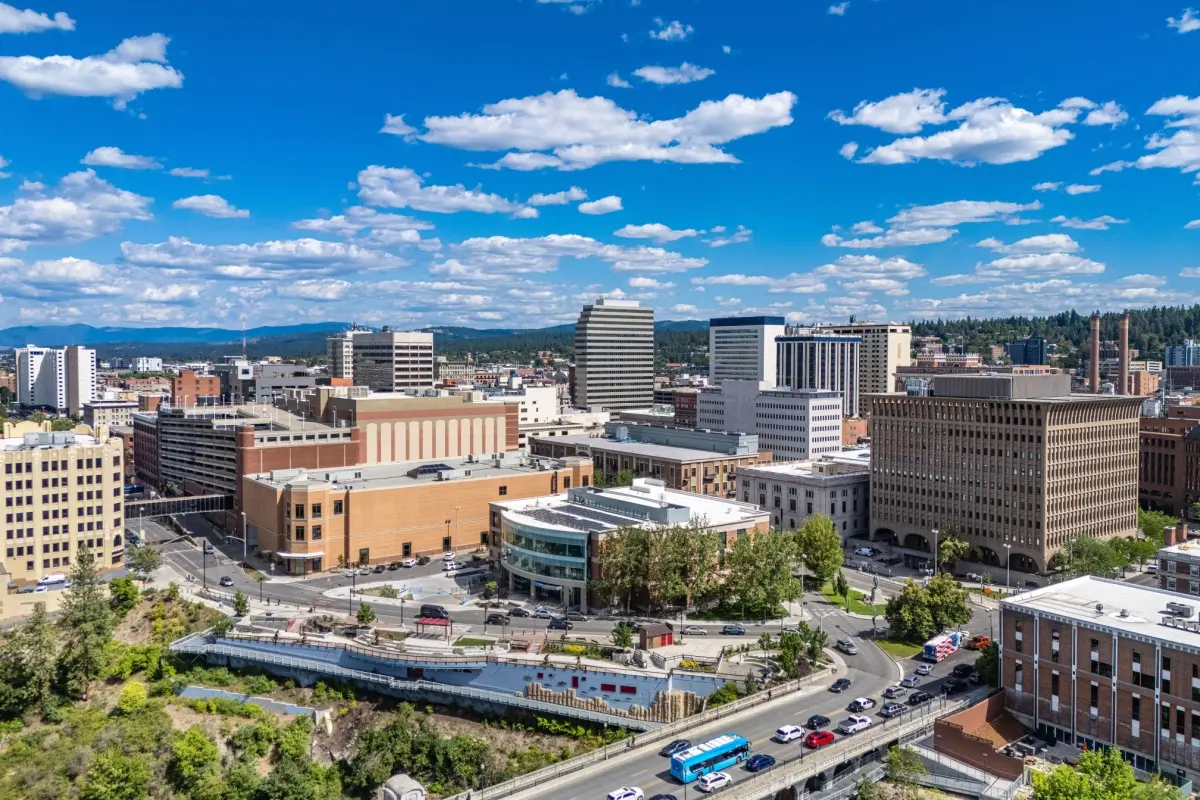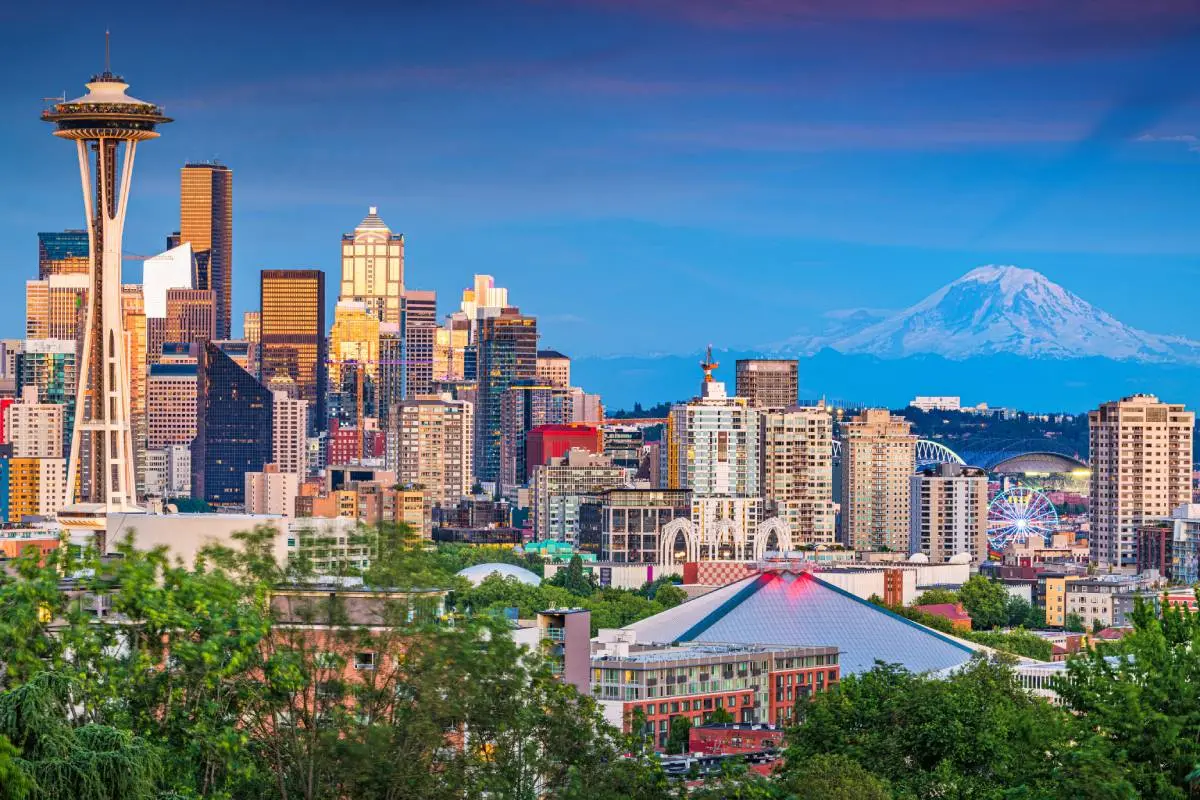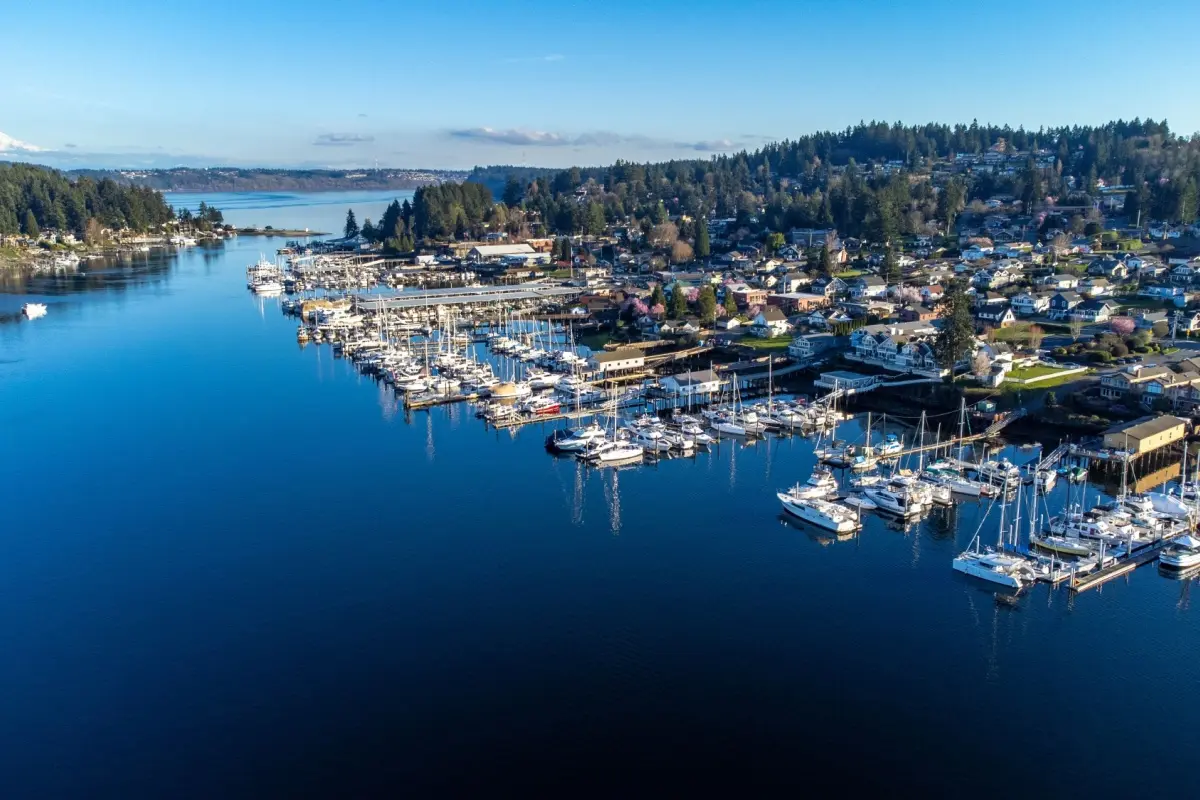Washington State has long been a magnet for retirees, and with good reason. From vibrant cities to tranquil seaside gold towns, the Evergreen State offers quite a scenic retirement in America. In this guide, we’ll explore the best places to retire in Washington, weighing the pros and cons of retiring here, smart financial tips, and the top towns and cities for retirement living.
4 Best Cities to Retire in Washington
When it comes to specific locations, the best cities to retire in Washington offer a blend of affordability, amenities, and quality of life. From small towns to mid-sized cities, here are four standout retirement destinations in Washington — each “best” in its own category.
Best for Cost of Living: Spokane
Spokane, Washington’s second-largest city, offers a far more affordable retirement than the Seattle area. Housing costs in Spokane are lower — the median home price in Spokane (around $356,000 as of early 2025) is less than half of Seattle’s median (over $800,000).

Retirees in Spokane enjoy a thriving community with plenty of healthcare facilities, cultural events, and outdoor recreation along the Spokane River. Despite being a city of over 220,000, it retains a friendly, small-town feel. You’ll find farmers markets, theater and symphony, and beautiful parks like Riverfront Park downtown. Many retirees also explore options of buying gold in Washington.
Best for Quality Healthcare: Seattle
Seattle offers unparalleled healthcare resources for retirees. As the largest city in Washington, it’s home to multiple nationally ranked hospitals — including the University of Washington Medical Center, which is rated the #1 hospital in the state and renowned for specialties like cardiology and oncology.

Seattle’s healthcare network also features Swedish Medical Center, Virginia Mason, and many clinics, ensuring that retirees have access to cutting-edge medical care from primary physicians to top specialists.
Best for Climate: Sequim
If you’re seeking mild weather and sunshine in Washington, Sequim is hard to beat. This quaint town on the Olympic Peninsula is famous for its “blue hole” microclimate — it sits in the rain shadow of the Olympic Mountains, resulting in only ~14 inches of rain per year. That’s practically desert-like compared to Seattle’s ~37 inches!

Retirees here enjoy considerably more sunny days and far less gloomy weather than most of Western Washington. The climate is temperate year-round: summers are warm but not hot (often in the 70s°F), and winters are cool but rarely severe (snow is infrequent).
The town (population ~7,000) offers a friendly, slower pace of life. You’ll find farmer’s markets, a growing number of wineries, and the famous Sequim Lavender Festival each summer. Outdoor lovers can golf year-round or explore nearby parks like the Dungeness National Wildlife Refuge.
Best for Community Vibe: Gig Harbor
Gig Harbor is widely recognized for its social atmosphere and civic engagement among retirees. The town has a high concentration of older adults (about 27% of residents are 65+), and it caters to them with plenty of recreation programs and community centers. In fact, Gig Harbor has topped Washington retirement rankings multiple times thanks to its wealth of community centers, recreational activities, and health care facilities per capita.

With no income tax, a world-class nature, and communities to suit every taste, Washington State can provide a wonderfully rich retirement. Just be sure to weigh the higher cost of living and rainy seasons as you plan the next chapter of your life.
Pros and Cons of Retiring in Washington
Retiring in Washington comes with unique advantages and challenges. Here’s a quick look at some key pros and cons:
| Pros (Why Retire in WA) | Cons (Challenges in WA) |
| Washington is one of the few states with no state income tax, meaning pensions, 401(k) withdrawals, and Social Security aren’t taxed. | Washington’s living costs exceed the national average. In fact, the state has the 7th highest cost of living in the States, with housing prices (especially near Seattle) well above average. |
| Nicknamed the Evergreen State, Washington boasts 15 National Park Service sites and over 140 state parks. Retirees enjoy abundant outdoor recreation — from hiking mountain trails to beachcombing along coastal parks — all amidst stunning scenery. | Western Washington is famous for grey, drizzly weather. Seattle, for example, sees about 37 inches of annual rainfall and lots of cloudy days. The damp winter climate can feel dreary if you crave year-round sun (though summers are gorgeous and drier). |
| Washington offers access to highly rated hospitals and medical facilities. Seattle is home to the state’s #1 hospital (UW Medical Center), and respected providers span the state, ensuring retirees have quality healthcare nearby. | With no income tax, Washington relies on sales tax. The average combined state and local sales tax is about 9.4%, one of the highest in the nation. |
Smart Financial Planning for Your Retirement in Washington
If you are on a budget or looking for low stress jobs after retirement , Washington has plenty to offer.
Is Washington a Good Place to Retire Financially?
From a financial standpoint, Washington is a mix of pluses and minuses for retirees. On the plus side, the state’s lack of income tax can significantly benefit those living on pensions or investment withdrawals. Retirees keep 100% of their Social Security and retirement account income, which is helpful when maximizing your retirement savings . Furthermore, Washington’s median household income is high (around $95,000 in recent years), reflecting a strong economy.
However, the cost of living is notably high. Washington has one of the highest living costs nationwide (about 14% above the U.S. average). Housing is the main culprit: for example, Seattle housing costs are over 150% higher than in cheaper Washington areas like Spokane.
Is Washington Tax Friendly for Retirees?
Washington is often considered very tax-friendly for retirees. The big benefit is no state income tax — meaning no state tax on Social Security, pensions, or IRA withdrawals. This can save retirees thousands per year compared to states with income tax.
That said, Washington makes up for it with other taxes. The state sales tax is 6.5%, and with local taxes the average combined sales tax is ~9.4%. Nearly everything aside from groceries and prescription drugs is taxed, so consumption costs are higher. Property taxes are moderate by national standards at about 0.8% of a home’s value on average.
How Much Money Do You Need to Retire Comfortably in Washington?
Because of the higher cost of living, you’ll likely need good monthly retirement income to live comfortably in Washington compared to many states. Recent data suggests that the average cost of living per person in Washington is about $60,500 per year when you factor housing, healthcare, food, transportation, and other expenses. Of course, how much you need depends on your lifestyle.
What Age Can You Retire in Washington?
Legally and practically, Washington doesn’t impose a special retirement age — you can retire at 60 or whenever your finances and Social Security timing allow. The earliest you can claim Social Security retirement benefits is age 62, though your monthly benefit will be about 30% lower than at full retirement age.
Full retirement age is 67 for anyone born 1960 or later. At full retirement age, you receive 100% of your benefit.
Is Florida or Washington Better for Retirees?
Florida often tops lists for traditional retirement living (sunshine and low taxes), whereas Washington offers a different but appealing package (no income tax, beautiful scenery, mild summers). If avoiding winter and joining large retiree communities is your dream, Florida is hard to beat.
But if you cherish the Pacific Northwest lifestyle, family ties in the area, or simply want to avoid Florida’s humidity and hurricanes, Washington can be an excellent choice. In fact, many rankings still include Washington among the best states to retire, especially for those who prioritize natural beauty and don’t mind the rain. It really comes down to personal preference — both states can provide a fulfilling retirement if you plan accordingly.
Calvin spent a decade as a financial analyst before pivoting to what he calls “the stories behind the numbers.” With a dual focus in economics and history, he writes about how historical financial trends (like gold standards, pension systems, and market bubbles) influence today’s money decisions.
